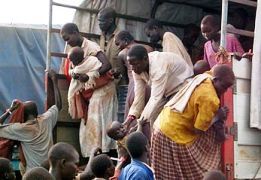WFP launches appeal for hungry southern Sudan
NAIROBI, Jan 9 (Reuters) – The World Food Programme (WFP) challenged donors to support a southern Sudan peace deal forged on Sunday and appealed for $302 million to fund emergency food relief for 3.2 million people in the war-shattered south.

|
|
Sudanese refugees arriving at Kyangwali settlement in Uganda after being displaced from their original camp in Achol. (UNHRC). |
“Over the next 12 months, some 268,000 metric tonnes of food will be required for war and drought affected people primarily in south Sudan,” said a statement by the U.N. programme, the world’s biggest food relief agency.
“Peace brings a whole new set of challenges with it,” the statement quoted WFP Sudan Country Director Ramiro Lopes da Silva as saying. “Many of those who fled their homes during the war have already started returning home, adding pressure to already limited resources available within these communities.”
Sudan’s Islamist government and southern rebels forged a comprehensive peace at a ceremony in Kenya’s capital Nairobi on Sunday, ending Africa’s longest-running civil war.
Sudan’s First Vice President Ali Osman Mohamed Taha and rebel leader John Garang signed the accord in Kenya’s capital Nairobi, ending a 21-year conflict in the south that has killed an estimated two million people mainly by famine and disease.
Da Silva added: “After the long-awaited signing … people have high expectations for change. The international community must show its commitment by addressing immediate needs while also supporting long-term reconstruction.”
During the conflict food production, often held up by fighting and continuous displacement, was additionally devastated by recurrent drought.
In 2005, food production in the south is expected to be particularly poor, due to late and erratic rains and the failure of seasonal flooding to make up for the arid conditions prevalent in the region, WFP said.
“As a result, the harvest is likely to be 46 percent lower than last year. With more than half a million refugees and displaced people expected to return home after the peace agreement, food shortages and hunger are a major concern,” WFP said.
